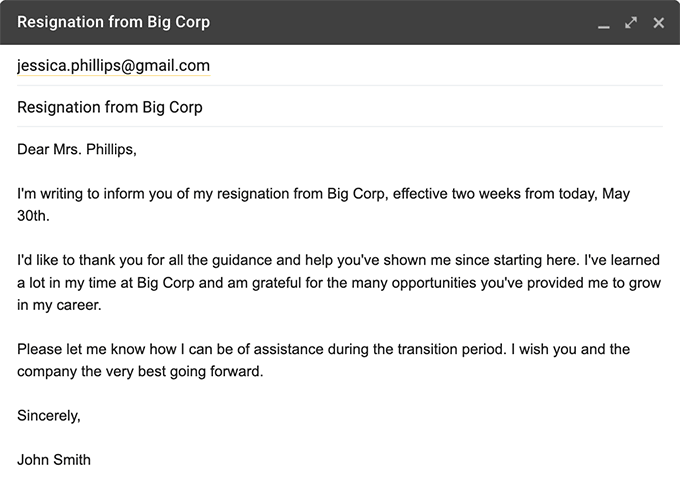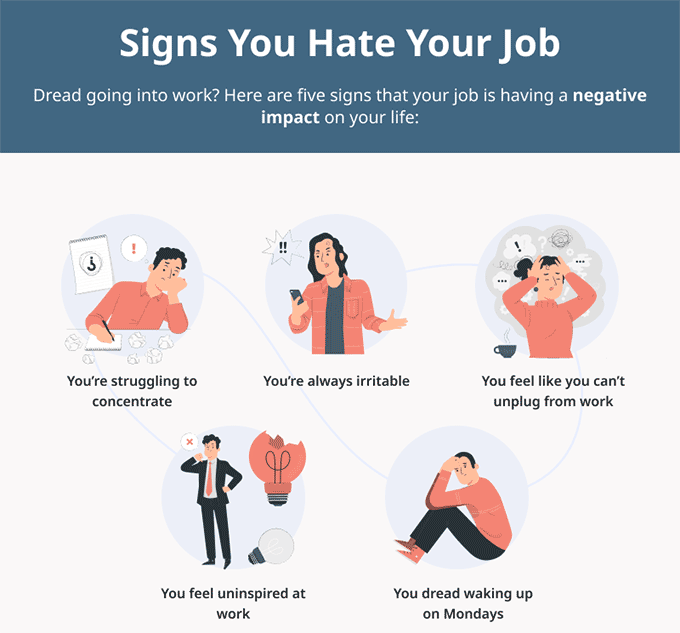If you just typed “I hate my job” into Google, you’re not alone. In fact, a worldwide Gallup poll found over 85% of people are unhappy with their jobs.
There are few things worse than having a job you hate. Whether you’re struggling with your boss, your coworkers, or your responsibilities, doing work you don’t like can have a negative impact on your physical and mental health – even when you’re not at work.
But while working a job you hate can feel like a dead-end, there are always steps you can take to change your situation.
We’re going to break down what to do if you find yourself hating your job, and how to make a positive change in your life.
Identify why you hate your job
Before you go quitting your job, you first need to think about why you dread going to work.
In some cases, the reason you hate your job is temporary or situational and can be resolved with some time or effort.
Here are some of the most common reasons why you hate your job:
You’re burnt out
Does it feel like your job sucks up all your time and energy? Like you can’t even find an opportunity to decompress anymore? Then you’re likely suffering from workplace burnout.
Burnout often happens when you have a fast-paced, demanding job. Trying to keep pace for an extended period of time results in you feeling fatigued, unmotivated, and stressed.
Fortunately, just because you’re burnt out doesn’t mean your career is coming to an end. If you still like your boss, your coworkers, and the industry you work in, then you might just need to find ways to reduce the amount of pressure you’re under.
What to do about it
There are many strategies to alleviate workplace burnout, such as prioritizing self-care or talking with your boss about reducing the tasks that stress you out. Ultimately, if you want to enjoy working at your current job, you need to develop a healthy work-life balance.
You hate your boss
If you get a pit in your stomach every time your manager messages or talks to you, then you probably hate your boss.
Bad bosses come in all forms. Whether your boss is abusive, disrespectful, incompetent, or a micromanager, having a boss you don’t get along with can ruin an otherwise good job.
If you work full-time, then you’re spending at least 40 hours per week interacting with someone that causes you anxiety. This isn’t a sustainable situation, and will only make you more miserable as time goes on.
What to do about it
Dealing with a bad boss isn’t easy, but there are still a couple of things you can do to improve your situation.
If you feel like your relationship with your boss can be repaired, then you should have a meeting with them and discuss the problems you have with their management skills. If they’re receptive to your feedback, then you might see improvements over time.
However, if your boss is abusive or has frequent mood swings then you should talk to HR or upper management about their behavior. If upper management intervenes you could be transferred to another manager you get along better with, or their intervention might cause your boss’s behavior to change.
You’re stuck in a toxic workplace
Toxic workplaces are cutthroat, non-inclusive, stressful, and breed an atmosphere of disrespect.
Abusive bosses and toxic workplace culture often go hand in hand. That’s because the people who are able to rise to managerial positions in toxic workplaces enjoy and help maintain the hostile environment.
If you work in a toxic workplace, it can quickly take a toll on your health and make every other part of your job feel unpleasant.
What to do about it
If you work in a toxic workplace, you probably already know it. You can try to talk to HR about the issues you’re having and see if they’re able to do anything.
However, if HR hasn’t intervened by now it’s likely that the work culture is accepted or perpetuated by upper management. In this situation, the best thing you can do is leave your job.
It’s never worth sacrificing your mental health for a position at a toxic workplace.
If you’re concerned about looking like you’re job-hopping, don’t worry. Most employers believe job-hopping is acceptable when you have good reasons for leaving your job (like leaving an abusive workplace).
Your work goes underappreciated
Every day you put your best effort into your job. You get results. But no matter what, you receive no positive feedback, praise, or opportunity for career growth. The only feedback you receive from your boss is when something goes wrong.
Having your work go unappreciated is a terrible feeling, and can quickly lead to you feeling unmotivated and burnt out at your job.
Feeling underappreciated is usually a problem that stems from poor management. Your boss should be providing you with positive feedback alongside any criticisms they have.
What to do about it
If your boss isn’t providing you with any positive feedback and it’s making you feel underappreciated, you should talk to them one-on-one about their management style.
Providing positive feedback is an area managers commonly struggle with. Usually, being upfront with your boss is all it takes to show them that they need to make a change in their behavior.
Your interests have changed
You started off enjoying the work you do – maybe it was even your dream job. But now you struggle to motivate yourself at work. What happened?
If you don’t feel burnt out but you’re still hating your work, it’s likely that your goals and interests simply no longer align with your job.
This can happen for a variety of reasons. For example:
- The company culture isn’t what you’re looking for anymore
- Your lifestyle has changed and no longer lines up with your expectations at work
- The issues and topics you’re passionate about have shifted
What to do about it
Think about what you want out of your job that you’re no longer getting from your current position.
If you like your current company but think you need a different set of responsibilities, see if it’s possible to apply for a transfer within your current company to a position that better suits your interests.
However, if it seems like your company just isn’t a good fit for you anymore, you should start looking for new positions.
If you’re applying for jobs in a different industry, you’ll need to write a career change cover letter to convince employers you’re worth taking a risk on.
You’re undervalued
Have you been at your job for a while, put in effort every day but barely get paid enough to live a comfortable life? Chances are you’re undervalued.
Being underpaid sends the message that your employer thinks you’re disposable, and that your work isn’t worth rewarding monetarily. Not only that, it also makes the rest of your life more stressful.
Working a 40 hour (or more) week but being unable to save money or pay bills is a frustrating, helpless feeling. No matter how passionate you are about your career, if you’re being undervalued you’ll quickly burn out and end up hating your job.
What to do about it
If you hate your job because you’re undervalued there’s a very simple solution: negotiate a raise.
Gather up any positive praise your work has received, plus any hard numbers that shows you’ve made a positive contribution to the company. Then talk to your boss about increasing your pay.
If your boss isn’t receptive to your request, it’s probably time to start looking for work elsewhere.
How to deal with a job you hate
Now that you know why you hate your job it’s time to do something about it.
Depending on your reasons for hating your job, there are two options you can take as next steps:
Learn to love your job again
If you generally like your career path, feel invested in your company’s goals, and enjoy your coworkers, then there’s still hope for you to learn to like your job (even if it doesn’t feel like it right now).
Maybe you’re going through a rough patch and are feeling burnt out, or you have a new manager that you don’t get along with. Either way, if the reasons you hate your job are specific and fixable, they can be resolved with some effort.
Try talking with your manager about your situation to see if there’s a solution that can be worked out. While that might sound intimidating, most employers prefer to accommodate their current employees than have someone leave and have to find a replacement.
If you like your current employer, try to work through your issues with them before you consider quitting.
Need some coping strategies? Here’s a checklist of things to help you manage a job you hate:
@resumegenius Hating your job sucks, but before quitting, here’s what you can do to help you cope with it 💪 #careeradvice #corporatetiktok #ihatemyjob ♬ Darling – Trees and Lucy
Leave your job
While we all need a paycheck to live, sticking with a job you hate negatively impacts your mental health, and can make your life miserable.
If it seems like the reasons you hate your job can’t be resolved, or you just work in a toxic environment, then you should quit your job. Simple as that.
However, it’s important that you have a plan to leave your job properly, rather than impulsively walking out the door (as satisfying as that might sound).
Here’s how to quit your job the right way:
Start a job search
Before you leave your current position, start a thorough job search so you’re not left unemployed for an extended period of time. Use a few different job boards for your search, especially if you’re looking for remote work.
If you haven’t applied to new jobs in a few years, then you should update your resume, brush up on how to write a cover letter, and review some of the most common interview questions.
Then start thinking about what type of job would suit you best. If you’ve had a change in interests, it might be time to start looking for work in a different field.
Additionally, update your LinkedIn summary and check your network for job leads. Finding positions through people you know is one of the best ways to land a new job.
Don’t burn bridges on your way out
Letting your employer find out that you’re quitting through a new job announcement on LinkedIn or walking out the door after you tell your boss what you really think of them might be satisfying, but it won’t do you any favors later on.
It’s okay if you hate your job, but it’s best if you keep it to yourself.
You never know if you’ll need a recommendation letter from your current employer, or if one of your coworkers will have a connection to a company you want to work for. To be on the safe side, you should leave your job respectfully and avoid burning any bridges.
To leave your job the right way, you should:
- Provide a resignation letter (or email) with at least two weeks notice
- Be respectful in your exit interview
- Tell your boss you appreciated working with them (even if it’s not true)
- Write a goodbye email to your coworkers
Here’s an example of a polite and respectful resignation email:

Click to rate this article
4.6 Average rating

















